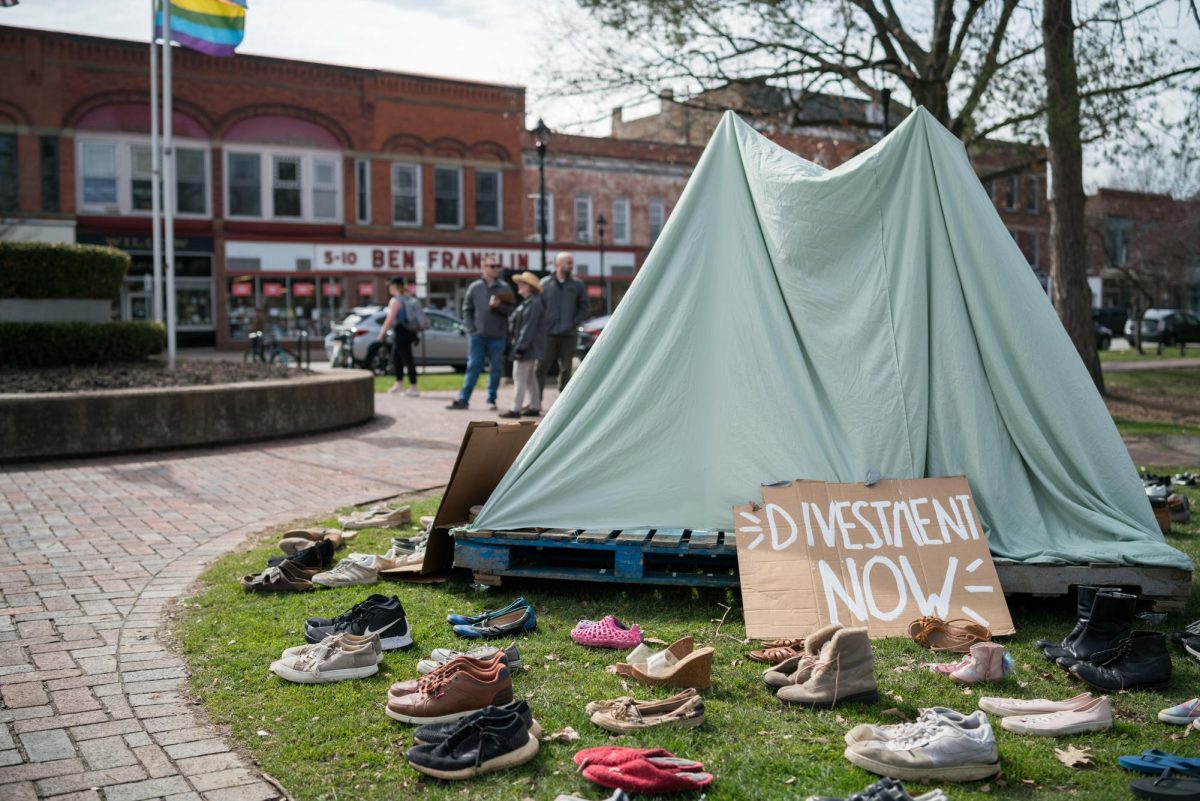Last Wednesday, representatives from Students for a Free Palestine and Jews for a Free Palestine met with Board of Trustees Chair Chris Canavan, OC ’84, Vice President Matthew Lahey, and Board of Trustees Chair of the Investment Committee Sean Gavin, OC ’98, to discuss how the student organizations could submit a formal proposal for divestment from Israeli companies amid Israel’s war in Gaza and the resulting humanitarian crisis. The meeting was facilitated by Dean of Students Karen Goff and the Student Senate.
“I think, in fact I know, that there is not a trustee that is not informed about what is going on in Gaza,” Canavan said in a meeting with the Review. “Students have the right to submit a proposal, but divestment — however you define that — may not be a stance the board agrees on. It will be considered very, very seriously.”
Canavan clarified the nature of Oberlin’s endowment, stating that the endowment is not invested in any companies. Instead, the endowment is invested in funds overseen by fund managers unaffiliated with the College. This means that the Investment Office is not at liberty to disclose the financial positions of Oberlin’s endowment because it is considered the intellectual property of the fund managers, according to Canavan.
This has historically posed a challenge for SFP. In 2002, Oberlin Students for a Free Palestine published a letter in the Review calling for the College to disclose its financial holdings or to affirm that the endowment was not invested in companies that finance Israel’s military (“OSFP Calls on College to Divest From Pro-Israeli Firms,” The Oberlin Review, May 24, 2002).
“We, Oberlin Students for a Free Palestine, call on Oberlin College, the Board of Trustees, and the Investments Office to make public its investments and financial holdings in Israel,” the article reads. “We call on the College to affirm that it is not invested in companies that finance the military occupation of Palestine by Israel, such as Lockheed Martin, Boeing, Exxon Mobil, and Oshkosh. Until the administration affirms this, we will demand this information to which everyone in our community should be privy.”
In 2014, the College adopted a divestment resolution, establishing its policy for handling divestment proposals. The policy holds that, in “instances so extreme that they shock the conscience, such as genocide, ethnic cleansing, … and other wide-scale acts of injustice,” the Board of Trustees will consider divestment from its endowment portfolio based on proposals by students, alumni, or employees.
The board will consider a proposed divestment if it meets three criteria: the investment finances the materials — like military defense weaponry — that exacerbate the cited injustice; divestment is likely to have an actual, disadvantageous financial and/or reputational impact that may change the behavior of the entity specified for divestment; and that the divestment is acceptable to the Oberlin community “based on the Board’s best understanding of the community’s opinion.”
This final criterion was the cited grounds for the rejection of SFP’s 2015 proposal for divestment from Israeli companies. The proposal began as a resolution passed by the Student Senate in 2013, calling on the College to divest from six companies — Caterpillar, Hewlett-Packard, Group 4 Securicor, SodaStream, Elbit Systems, and Veolia — that the resolution claimed profit from Israel’s occupation of Palestinian territories.
The 20-page proposal was rejected by the board seven months after it was submitted. According to a Review article announcing the decision (“Board Rejects Student Divestment Proposals,” The Oberlin Review, Oct. 30, 2015), the board described the proposal as “divisive.” The Review went on to explain that SFP had “failed to provide proof that the student body was united on the issue,” according to a student representative from the organization.
“Though it determines that the proposal ‘will not be acceptable to the larger Oberlin community,’ it does not define in any way who they consider this community to include, nor how they came to an understanding of its opinion,” a letter from SFP to the Review following the decision reads (“Board Dismissed Concerns of SFP,” The Oberlin Review, Nov. 13, 2015). “They also do not cite those from whom the proposal has ‘elicited strong opposition’ and, once dismissing it as ‘divisive,’ they do not engage with its content and how it pertains to other criteria for application approval.”
After Hamas’ Oct. 7 attack on Israeli citizens and the ensuing war between Hamas and Israel, which has resulted in the deaths of over 30,000 Palestinians, Students for a Free Palestine and Jews for a Free Palestine began their dialogue with administration about divestment. In December, representatives from these groups met with Chief Investment Officer Jun Yang to discuss the ambiguities of divestment, such as how the student organizations should go about conveying community opinion and how they should identify companies that the College is currently invested in to include in their proposal. Yang was unable to disclose the names of any companies because of legal contracts between the College and the endowment’s fund managers, as explained by Canavan.
“We brought up the idea of community sentiment in that meeting and we were like, ‘What possible measures are there?’” College fourth-year Jonas Nelson said. “We thought something like a poll would be able to demonstrate the community’s opinions, but they really could not give us a straight answer on what metrics could be used.”
The poll, which was launched Feb. 29, collects yes or no answers from currently enrolled students to a single question: “Do you agree to Oberlin College’s Divestment from Israel?”
“We got around 1,000 votes in the first 12 hours or so,” Nelson said. “The point of that … was to just put an actual number on support when we’re discussing this with the administration, to be able to — instead of just saying a majority of campus supports Palestine — to be able to actually show that, at this point, around half of the campus has voted yes on it.”
The referendum’s accompanying statement claims that the College is invested “in corporations complicit in the ongoing genocide of Palestinians in Gaza” and includes three demands. First, that the College “must immediately divest from all funds with investments in corporations and institutions complicit in genocide, settler-colonialism, apartheid, or ethnic cleansing against Palestinians.” Second, that the College implements investment screens and defines the aforementioned funds as those invested in companies that materially contribute to the Israeli military, that contribute to the construction of the separation wall, and that have facilities in Israeli settlements in Palestinian territories. Finally, it demands that the College establishes financial transparency and student oversight of its investments.
“Oberlin College has a divestment policy, which is unique,” College second-year Maya Miller said. “It feels dramatically wrong for us not to be in conversation about using the policy in a moment like this. And I think that there are many colleges who have students that are pushing for divestment, but those colleges don’t have divestment policies. We are in a unique situation to be one of the first. … We have internal precedent for it: Can we be the precedent for other places? And also, what message are you sending by having a bunch of money invested in Israel, in the occupation industry, in the military-industrial complex, in weapons? It feels like the purpose of an academic institution is to think critically about the ways that it’s engaging with the world, and divestment is a way to do that.”
President Carmen Twillie Ambar shared her concerns with the practicality of any divestment proposal.
“Can we apply it?” she said. “Can we implement it?”
Canavan agreed that complete and total divestment from investments with any connection to Israel could result in a loss of $30–40 million a year from the endowment. He communicated that he would be available to help students in SFP and JFP understand how the board would consider a proposal.
“I told them to start with the most restrictive proposal,” Canavan said. He added that this was not an indication of how the board would decide.










